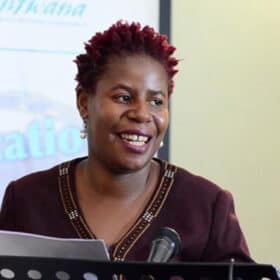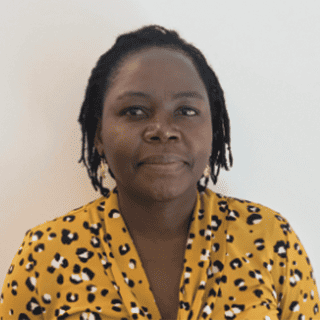What Will it Take to Advance Gender Equity? Reflections from JSI Experts and Partners
August 10th, 2023 | viewpoint
Belindar Kwamboka, a youth sexual and reproductive health advocate facilitating a group discussion during JSI side event at Women Deliver 2023. Photo: JSI
Gender equity is not possible if women and girls can’t access high-quality health services and education. They must also be involved in decision-making and have access to economic opportunities. That is why JSI is committed to ensuring that all people have access to health services, education, and economic opportunities regardless of gender, circumstances, or where they live.
From July 17 to 20, JSI experts joined over 6,000 policymakers, leaders, and gender advocates in Kigali, Rwanda, and more than 200,000 virtual participants at the Women Deliver 2023 conference to find evidence-based solutions to gender inequality and inequity.
In line with the conference theme, Spaces, Solidarity and Solutions, JSI staff participated in a panel discussion on the power of equity in global development, and hosted two side events featuring youth leaders, education specialists, and public health experts. They also partook of various learning events on barriers to achieving gender equality, including women’s limited access to education; restricted access to health (including sexual and reproductive) services; lack of economic autonomy; and disproportionate exposure to climate crises.
This year, 2023, is the midpoint of the implementation of the UN Sustainable Development Goals 2030 agenda. It is a time to pause and examine the behaviors and societal norms that have long hindered gender equality and women’s empowerment and how they must change if we are to live in a gender-equal world in just seven years.
What are some ways to gain sustainable results? We asked JSI experts and partners who attended WD 2023 to reflect on key messages and action points that they plan to advance in the various initiatives and projects they lead.

“According to the UN, we are behind by 200 years in terms of the policy frameworks we need to improve the condition of adolescent girls and women in the world”. And if we are to achieve equity for women and girls, we need to be aggressive and our advocacy efforts need to be accelerated,” said Patience Ndlovu, executive director of Bantwana, a World Education initiative dedicated to improving the well-being of children,and their caregivers and families affected by HIV and poverty in Eswatini, Malawi, Mozambique, Tanzania, Uganda, Zambia and Zimbabwe.

Locally led actions must be supported and institutionalized in the design and implementation of projects aimed to advance gender equality and women and girls’ well-being.
“We must hold ourselves accountable to our promises. In the next iteration of the HCDExchange, we hope to contribute holistically to driving equity in health, education, and economic opportunities. We will soon launch local market-driven products, and will localize design and increase access to knowledge and practice of human-centered design,” said Muthoni Wachira, project director of HCDExchange, the JSI-supported knowledge hub dedicated to using HCD to meet sexual and reproductive health needs for youth and adolescents.

Investing in training and capacity- building programs that focus on gender-intentional policies and practices will foster transformative leadership at all levels of society. Furthermore, collective efforts among stakeholders to break away from a siloed approach to ending gender inequality are necessary.
JSI’s Reimagining Technical Assistance body of work is enabling us to spark critical conversations and change development assistance norms, policies, and practices. It is guided by a framework that identifies changes needed to move to more country-driven and equitable health systems.
“A mindset shift is critical, and requires us to trust and support others as they lead strategies in their communities,” said Dyness Kasungami, JSI senior child health adviser and coordinator and Global Child Health Task Force secretariat.

Encourage partnerships that convene male allies and youth.
“I have witnessed the adverse effects of gender inequities on the health and well-being of individuals, families, and entire communities. As a father of three amazing daughters, I must work to make the world a place where women can thrive,” said Francis Ohanyido, public health physician and a panelist at our RTA side event.
Over the last 45 years, JSI has worked with governments, civil society organizations, and funders to transform gender norms and shift power dynamics. Our projects integrate gender considerations into every aspect of our work. We ensure that individuals of all genders, including those in vulnerable positions, have a central role in shaping program strategies that will support improvements in their lives through greater health, education, and socioeconomic equity. Learn more.
Our Behavior Initiative integrates behavioral thinking into everything we do. Moving beyond conventional approaches, we combine social, ecological, and behavioral applied sciences with innovations from marketing, design, tech, and other sectors to help people live healthier lives. Learn more.
We strive to build lasting relationships to produce better health outcomes for all.